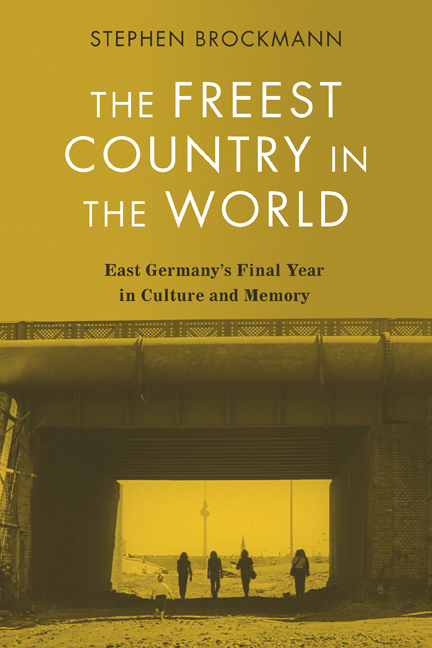Book contents
- Frontmatter
- Dedication
- Contents
- Acknowledgments
- Introduction: The Memory of Freedom
- 1 Protocols of History: Reunification Documentaries from 1989/1990
- 2 Anarchy in the GDR
- 3 The National Liberation Zone
- 4 Coming of Age as the State Dies: Three Novels and Their Heroes
- 5 Provincial Theater: Fiction Film Struggles to Address German Reunification in the Early 1990s
- 6 The Grand Theater of the East and the Imaginary Stasi: The Emergence of the Standard Depiction of German Reunification in Film and on Television
- 7 Ritual, Repetition, and Memory: Commemorating and Memorializing 1989/1990
- Conclusion: The Last GDR
- Selected Works Cited
- Filmography
- Index
Conclusion: The Last GDR
Published online by Cambridge University Press: 11 January 2024
- Frontmatter
- Dedication
- Contents
- Acknowledgments
- Introduction: The Memory of Freedom
- 1 Protocols of History: Reunification Documentaries from 1989/1990
- 2 Anarchy in the GDR
- 3 The National Liberation Zone
- 4 Coming of Age as the State Dies: Three Novels and Their Heroes
- 5 Provincial Theater: Fiction Film Struggles to Address German Reunification in the Early 1990s
- 6 The Grand Theater of the East and the Imaginary Stasi: The Emergence of the Standard Depiction of German Reunification in Film and on Television
- 7 Ritual, Repetition, and Memory: Commemorating and Memorializing 1989/1990
- Conclusion: The Last GDR
- Selected Works Cited
- Filmography
- Index
Summary
May life be kissed …
Is this perhaps maybe
Already the land of fairy tales?
—Sandow, from the film flüstern & SCHREIENTHE FIRST THREE CHAPTERS of this book dealt with the immediate culture of the German reunification period, while the last three chapters explored after-the-fact attempts to address the 1989/1990 period culturally and politically. The middle chapter, Chapter 4, examined literature: three novels by writers who were either young men or adolescents at the time that unification took place. The three coming-of-age novels show how talented writers employing an autobiographical mode can try to make sense of what happened to them in earlier years. The novels still contain some of the apparent authenticity and intensity of immediate personal experience, and yet they also benefit from the wisdom of age, maturity, and structuring. They are idiosyncratic and highly individual but at the same time accessible to other people in other places and times. They have the potential for a staying power that other media do not always have.
The structure of the book, with its two-part division between the actual culture of 1989/1990 and post-facto remembrances of that culture, makes it clear that what is remembered and talked about now, over three decades after the events in question, was not necessarily what was considered important or even worth mentioning at the time. What we talk about and believe we remember now when we imagine the years 1989/1990 is by no means identical to what was actually talked about and commented on at the time. The difference is striking.
The most obvious example of the difference between then and now is the Stasi, which was not prominent in discussions or depictions created in the immediate unification period, but which, over the intervening years, has come to take on an overwhelming symbolic importance. The Stasi has come to stand for the entire GDR, and current depictions of 1989/1990 tend to impute to it a power that it did not have at the time. Its mission, after all, was to serve as the “shield and sword” of the ruling socialist party. It abjectly failed at that mission. 1989/1990 was the moment of that spectacular failure. Chapter 6 described the gradual development of what I call the “standard depiction” of German reunification in film and on television, which relies heavily on the Stasi as a dramaturgically useful antagonist.
- Type
- Chapter
- Information
- The Freest Country in the WorldEast Germany's Final Year in Culture and Memory, pp. 293 - 308Publisher: Boydell & BrewerPrint publication year: 2023



